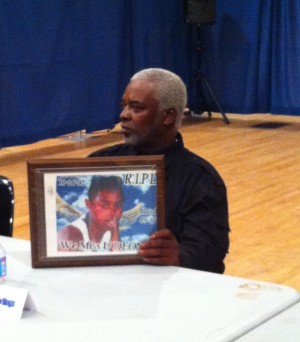Trayvon Martin Case Inspires Discussion Of Racial Profiling In D.C.

Elahe Izadi / DCentric
Charles Rawlings holds a photo of his son, DeOnte, who was shot and killed by off-duty police officers.
The Trayvon Martin case has spurred conversations in communities across the country over racial profiling and unequal treatment in the criminal justice system. Del. Eleanor Holmes Norton convened a D.C.-specific meeting Tuesday night, where she also announced that she plans to introduce a bill reestablishing a federal grant program for states to focus on racial profiling.
The program would pay for developing state anti-racial profiling laws, collecting data on traffic stops, training police officers and running fashion programs meant to reduce racial profiling. A similar grant program ended in 2009.
The Tuesday night forum by Norton’s D.C. Commission on Black Men and Boys was meant to “focus on eliminating the branding of African American boys and men on sight as criminals or in other negative ways,” Norton said.
There are a number of stories similar to the Trayvon Martin case, but not all have received the same level of national attention. In D.C., one of the most notable such cases is the 2007 death of 14-year-old DeOnte Rawlings, who was shot in the back of the head by two off-duty police officers after the boy allegedly stole one of the cop’s minibikes. The officers were never charged with a crime, and the family received a settlement over a civil lawsuit filed against the city.
Charles Rawlings, DeOnte’s father, said during the forum that his heart goes out to the Martin family.
“When you lose a child and when you’re alone, people don’t know what you’re going through,” Rawlings said. “It’s so painful that he’s not here anymore… My pain [doesn't] ever go away.”
“Every day I think about it. I miss his smile, sending him off to school,” Rawlings continued. “Now, [one of the officers] has a newborn child he can look at every day. Me? I got to go home and look at a picture.”
One commissioner, Peaceoholics founder Ron Moten, asked whether people being violent to each other within the black community makes “other people feel like they can come and do whatever they want to us?”
Rawlings noted that his other son, 21-year-old George, was shot and killed in 2009 by a teen who was “his best friend who he grew up with.”
Other speakers during the forum emphasized that racial profiling still occurs in D.C. Ryan Washington, 17, shared his experience as being one of few black students at his private high school. The Ward 8 teen suggested that schools with few minority students should hire minority teachers.
Another speaker, Barry Hudson, said he teaches his two black sons that “this is a city that has eight wards. Unfortunately it’s a city that’s very divided. There’s a lack of tolerance for the young men who look or dress a certain way.” But Hudson added that there’s “no need or nothing forcing the children to interact” with many adults in the city, particularly transplants to D.C. who “don’t interact with individuals born and bred in the District.”
-
Answer




